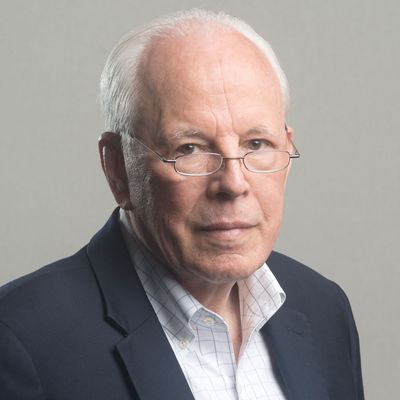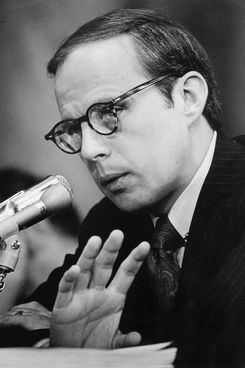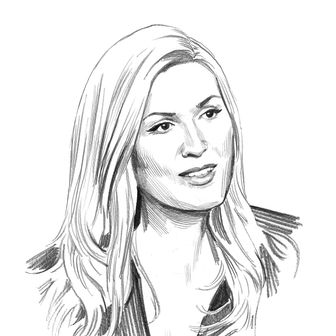
White House Press Secretary Sean Spicer had just refused to confirm or deny that President Donald Trump is secretly recording people in the Oval Office when I reached John Dean by phone on Friday afternoon. The former White House counsel to President Richard Nixon has become, in the 42 years since the Watergate scandal, a historian of that moment in American history of which he was a crucial figure. With Trump acting more Nixonian than ever — even firing the man who was investigating his campaign, FBI director James Comey — Dean’s astute political analysis is especially relevant. Dean spoke to me about Trump, Nixon, and taping systems as he drove home from a television appearance in Los Angeles. Our conversation has been lightly edited for clarity.
I am recording you, just so you know.
I’ve got you on my car phone so I can drive without getting arrested.
Did you happen to see the briefing today?
I saw parts of it.
Sean Spicer would not say, definitively, whether President Trump is recording people in the Oval Office, or whether he’s installed some sort of system to record people.
The statement was pretty vague by Trump in the tweet. It’s very hard today — Trump referred to “taping,” well, today you don’t tape anybody. It’s all digital. [Laughs.] We don’t use electronic tape anymore. So, it would be very easy for him to have his smart phone on the table, in his pocket, and record it! I don’t know if he did that or not. So, we’ll find out, ‘cause there’s already congressional effort to subpoena whatever he’s got.

Can you tell me a bit about the moment when you found out that Nixon had been recording your conversations — you were relieved, weren’t you?
It was very odd. I was in the witness-protection program. I had testified I thought I was recorded, and that’s how they ended up finding the taping system. But aside from that story, I was in Melbourne, Florida, and had a call from Sam Dash, and he said, “You’ve gotta come back up to Washington.” And I said, “What for?” He said, “I can’t tell you.” But they had learned from Butterfield of the taping system, and they were, I think, terrified that my testimony might have all been made up. [Laughs.] And so, they wanted to get my reaction. So Sam Dash and a guy by the name of Jim Hamilton, one of his aides and lawyers, I got back up there to Old Town and they came out and met me on Sunday, that would’ve been the 15th of July, 1973. And Sam said, “How would you feel if I told you that not only the conversation you thought you were recorded, but all the conversations you had with Nixon were recorded?” And I said, “I’d be thrilled!” And Jim Hamilton who was watching later recounted it, told me he could see a smile coming over my face as Dash was telling me this. And they all, they left very relieved. I said to him, “Listen, you’re gonna find I was very cautious when I testified.” Because I thought he had recorded me on one or more conversations.
Would it surprise you if President Trump was doing the same thing?
No, not at all. Would not surprise me. The other thing is, I’m told he’s not very mechanical. He’s kind of like Nixon in that regard.
What do you mean by that?
That he is a kind of a klutz. In other words, he’d have trouble surreptitiously recording somebody, you know, starting the machine, if it wasn’t going and what have you. Nixon would’ve had the same problem had it not been installed.
What did Nixon do, physically, that suggested you were being recorded?
I testified about that. And what happened is, in one of the more amazing conversations I had with him, in a recording where the entire reel later has disappeared, the 18.5-minute gap is baloney, there’s nothing on there. That’s real early. This was on April 15 that I thought he was recording me because he started out with leading questions and that was very unusual. Then, I would give him answers that he was unhappy with and he would, you know, sort of pass over them or try to make me change them. For example, he said, “You know John, when we had that conversation about a million dollars, and you told me it costs a million dollars for these guys and I said that would be no problem, you knew I was joking, didn’t you?” And I said, “No sir, I did not know you were joking.” And then at one point, he gets up from his chair, he’s in an ottoman, feet up and what have you, and goes over to the corner of his office and in a stage whisper, he says to me, “I was foolish to talk to Chuck Colson about clemency for Hunt, wasn’t I? Was that an obstruction of justice?” And I said, “It probably was, Mr. President.” And at that moment it clicked that he was recording that conversation, because he wanted to hear my reaction to that but he didn’t want the question to be heard from the corner of the office. He went about as far away from his desk, and that’s what I mean by klutzy. Haldeman commented on that, that Nixon wasn’t good at that sort of thing. Now, I don’t know if Trump is any better or not. He certainly lies with ease.
In what ways do you think he’s like Nixon?
Well, I think they’re both authoritarian personalities. We only know of Nixon’s full personality because of his taping system. But Trump just doesn’t try to hide anything, he’s just out there. Nixon was very shy with strangers and audiences and what have you. Highly rehearsed, really prepared himself for everything from press conferences to what looked like extemporaneous speeches. Nixon was very inarticulate in a very similar way to Trump when he was just speaking to people on his staff and what have you, a lot of repetition, a lot of jumbled phrases rather than sentences, thoughts are choppy. Nixon was a narcissist to a degree, not quite as off the charts as Trump, but you don’t have many wallflowers that do run for president.
Can we talk about the Saturday Night Massacre? Did you think that Tuesday night was anything like that?
There were some echoes, but not much more. Echoes being the brutal way it was handled, and so unnecessary. But not quite the same stage, where Comey wasn’t defying Trump, whereas Archibald Cox clearly was, and both of them had the power to do what they did, but it wasn’t very wise to do.
But we don’t necessarily know yet that Comey was not defying Trump.
We don’t know of any evidence that he was defying Trump, but I don’t know that if he had told Comey to back off, that that wouldn’t have leaked. And Trump was so upfront with Lester Holt, I think he would’ve said so! I think he revealed his mindset.
What advice do you have for the people in the administration who are being roped into all of this?
Well it’s tough, it’s very tough the situation they’re in. Some of them are going to be witnesses and they’re gonna have to get lawyers and spend money that they don’t have, that happened during Watergate. Some of them will need lawyers because they’ve gotten themselves on the wrong side of the law, if they’re not careful. So it’s an unfortunate situation. Some of them are obviously true believers in what Trump is doing. How they do that, I don’t know, but obviously, 60-something million people thought that way, too, to vote for him. A lot of people are not gonna put their work at the White House on their résumé.
Would it be smart for people to just get out now?
They shouldn’t go in. [Laughs.]
How do you think all of this ends?
How does it all end? [Laughs.] Not well for Trump. I’m not too good at the tea leaves, I don’t think anybody is. I just can’t believe that there isn’t something there on the Russia matter, with Trump doing all that he’s doing. He’s throwing every signal out that he’s got a problem, and he’s trying to make it go away. So that’s why I say I can’t imagine it ending real well for him. He’s trying to bend reality to his vision of what it should be, and that’s pretty hard to do.






























